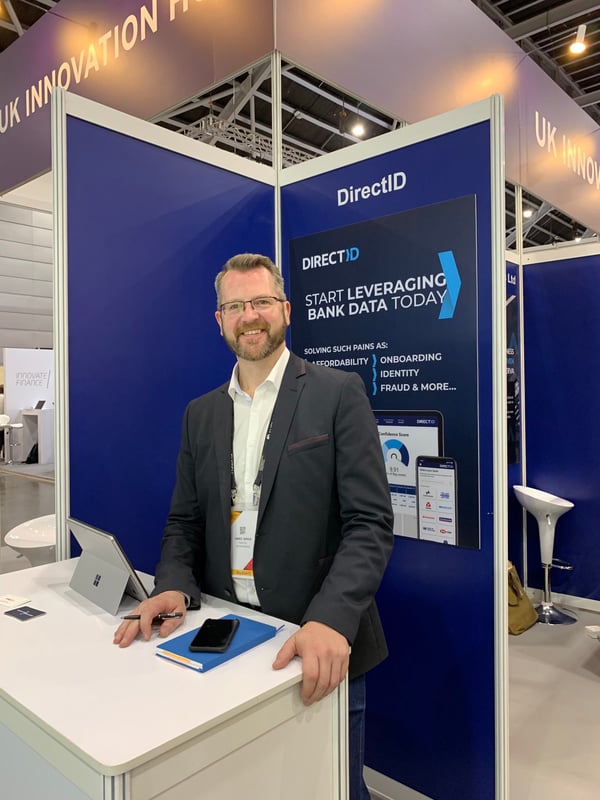Towards the end of last year, we at DirectID were delighted to put pen to paper on an agreement with industry body the Lending Standards Board to work together on market education in the lending space.
As we noted during our press release at the time, the Lending Standards Board was an ideal partner for us because they are a non-partisan, independent membership body. They are moreover experts in the field of lending.
After exploring a number of different opportunities it was agreed that we would make use of the podcast medium to educate our listeners. “The Future of Lending” podcast was thus born.
The conversation, between DirectID’s CEO, James Varga, and the LSB’s Senior Insights Manager, Harry Hughes provided a wealth of information and knowledge into Open Banking, bank data, and benefits for both consumers and business.
In this article we explore the top 10 learnings from the two part episode.
Convenience is Key
This is a point that JamesVarga has been making for a number of years and will continue to do so. His argument that “bank data is pointless, it’s what you do with it that counts” is reflected in the work of DirectID(who provide far more than just the raw data).
For James what is important, is that once consumers begin to feel the benefits of Open Banking, they will use it. At this time, use cases that can be matched to fully fleshed out products are thin on the ground.
Key quote from James:
“If you do think about the context and what's in it for consumers especially, as one of the lessons we've learned is, uh, convenience is the biggest motivator. If you can offer convenience in exchange for sharing that data, then the vast majority of people will do it.”
Bespoke Offerings
One of the key drivers of customer adoption is also likely to be that consumers will be able to find offers that are bespoke to their needs – thus driving down prices. If by entering your bank details you could find a rate on a car loan or mortgage that offered 2% instead of 5% interest, then naturally this will drive consumer behaviours.

Key quote from James:
“...making it mandatory becomes a scary thing for consumers. Finding out what the benefit to them is and then layering that into the call to actions and the conversation that people are having with the consumers. Absolutely beneficial. And just give people a choice.”
Open Banking Functionality
With a wealth of FinTech’s, banks and tech firms working on their own product offerings, Open Banking has yet to have its potential fulfilled. As we speak, new product offerings are coming to market at a very fast pace, and as we begin to see overlap, there will follow a period of consolidation. During this period, it is likely we will see the true functionality of Open Banking working to its maximum potential.
Key quote from James:
“...I think as an industry, this really comes down to the current challenge. How do we build products and services that benefit from bank data, from open banking. And I think we're just starting that journey just now. So far we haven't quite realised how to really maximise the benefit of open banking.”
Digital Banks
Digital banks have been at the forefront of increasing customer expectations on experience, and this is having a resultant impact on Open Banking. Soon, it will no longer be expected that a customer must visit a branch twice and mail in three months' worth of bank statements to apply for a loan or mortgage. As consumers begin to expect this kind of experience throughout their financial lives, Open Banking will be paramount in offering this kind of service.
Key quote from James:
“Maybe asking people to jump through the hoops that we've always asked them to do, to come into a branch to just be given that car loan at 30% because that's what we do and there isn't any other data, so let's not change a type thing, that's coming under pressure. It's exciting to see things start to change for us to start to reimagine what that overall journey or that value proposition that experience should be for somebody.”
Customer Education
The very sensible question of whether further education for consumers in order that they should have a firmer understanding of how they directly benefit from Open Banking was raised. James countered that customer education was indeed not necessary; instead what is required that consumers are educated on the benefits that Open Banking can bring them. He raised parallels between Open Banking and 5G, commenting that no one really cares about 5G – what they care about is holding video calls that don’t drop, or downloading movies in seconds instead of minutes.

Key quote from James:
“But when we go out and talk to people, when we work with our customers to try and get people through that process, get them to connect their, their consumers, their applicants to connect their bank data, it really comes down to call to action, and convenience more than anything else.”
Consumer v Business
A consideration that gets little coverage is that the benefits of Open Banking are as strong, if not stronger, for businesses, than for individual consumers. The lending industry for example, is already making operational cost savings, time savings, better decisioning and offering better customer experience through the use of Open Banking.
Key quote from James:
“… The impact of the industry is even more beneficial than that of a consumer. It's one of the reasons why we focus on customer onboarding and credit risk decisions in lending, because it does have a benefit on both sides... The user experience can change so as a consumer to get a 30 second loan or mortgage would be fantastic. Next time I remortgage instead of it taking two months, I would love for it to be 30 seconds.”
Pace of change
James well understands that the move to using bank data can feel intimidating to many who are used to current internal processes, and worry about the perceived risks of Open Banking. During the podcast he was at pains to stress that it was now feasible to set up and start consuming bank data within a couple of days (a feature offered by DirectID). As bank executives become more comfortable with its utilisation, it is possible to add additional features, or use new data sets with the ability to gain insights from the data.
Key quote from James:
“I always suggest people start small, connect the bank account to maybe help some of the affordability, credit risk, some of the low hanging fruit, reduce your fraud and impersonation fraud, that sort of thing...
“You can figure out what works for you and your products and your audience and start to roll it back up into your product more holistically over time.”
Regulators key to success
It has widely recognised that the UK has been the market leader in the creation of Open Banking. Being at the forefront of this new paradigm has meant that the regulators have had no other examples to learn from. The Competition and Markets Authority (CMA) set up the Open Banking Implementation Entity (OBIE) under the stewardship of Imran Gulamhuseinwala to oversee its implementation. The OBIE and CMA have done a sterling job in ensuring that APIs have come online and or of high enough quality for use with third parties.

Key quote from James:
“...This is the point of open banking in the UK. And the reason why it's driven by the Competition and Markets Authority is to increase competition in the market to make things more accessible both for the consumers and the industry.”
Empowering customers
Consumers are naturally very trepidatious about sharing their bank information with anyone. At the same time, we have an interesting juxtaposition, which is that our consumer data has been leaked and lost to such an extent that it is all over the internet. Email addresses, passwords, card numbers and more can be found by anyone with a network connection and malicious intent. To that end, James observed that consumers need to start thinking of “one-to-one" relationships with third party vendors, whereby we deal with individual third parties on a one off relationship
Key quote from James:
“... most people's usernames and passwords have been exposed in one form or another. Your personal data is out there. I mean the bureaus have it, the fraudsters have it, it's all there. It's now more of a mitigation strategy where we need to take to look at how do we reduce the impact. But the data's out there and it hasn't really changed the world.”
Industry can profit
As well as directly benefiting both industry and consumers, it also now widely accepted that industry should be able to build commercial models that allows them to profit from customer data. Consumers need to be made aware of the value exchange for this to take place with consent, and James made the point that we give data every day to companies such as Google and Facebook. To make a decision based on credit risk, however, requires the need for bank information.
Key quote from James:
“GDPR has come along in the last couple of years and said, actually, as consumers, we have a right to own and manage and do things with our data. Which clarified a huge amount of differing views in the market around who owns personal data. Is that yours or is it the corporations and the institutions? Also open banking as a layer on top of that has said it's okay to make money from that. It's okay to build models, business models, commercial models around consumers sharing their data and making money from it.”
From the points made above, it is clear that there is still a lot of conversation to happen around Open Banking. Questions are still being raised, and it is only through further debate and discussion that we hope to answer the fundamental points.
The discussion that took place in this podcast was designed to provoke further debate around lending, and the impact of Open Banking.
The full recording to listen to the two parts of the podcast can be found, here:








